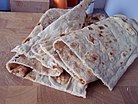| Part of a series on |
| Mandaeism |
|---|
 |
| Religion portal |
In Mandaeism, the ṣa ( Classical Mandaic: ࡑࡀ) is a rolled-up piece of sacramental flatbread that contains nuts and raisins, is also used in ritual meals for the dead and has a phallic symbolism. It is rolled up like a scroll. [1] [2]
It is distinct from the pihta and faṭira, which are flatbreads that are not rolled up. [2]
The ṣa is also mentioned as the 'great first sindirka (male date-palm)' in the Scroll of the Great Baptism (line 139 f.). [3]: 69
See also
References
- ^ Drower, Ethel Stefana. 1937. The Mandaeans of Iraq and Iran. Oxford At The Clarendon Press.
- ^ a b Buckley, Jorunn Jacobsen (2002). The Mandaeans: ancient texts and modern people. New York: Oxford University Press. ISBN 0-19-515385-5. OCLC 65198443.
- ^ Drower, E. S. (1960). The secret Adam: a study of Nasoraean gnosis. Oxford: Clarendon Press.

